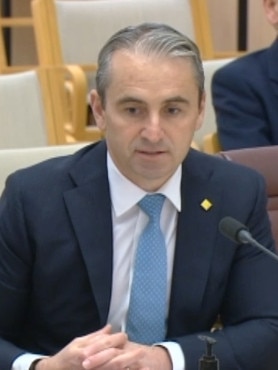CBA, NAB, Westpac warn against ‘enshrining old practices’
Major bank bosses facing a grilling over branch closures in rural Australia are warning against mandates in a changing world.

Bank executives grilled at a Senate inquiry on Wednesday warned politicians against enshrining “old practices” by potentially mandating a requirement to keep a significant portion of their bank branches open in regional Australia.
National Australia Bank chief executive Ross McEwan said lawmakers should be “very careful” not to do that in a changing world where people are using technology to access digital banking services instead of going to branches and using cash.
“It sounds like a world that would never change, but it is changing dramatically,” he told the senate inquiry grilling bank executives over the impact of their decisions to close bank branches on rural communities on Wednesday.
“Let’s not enshrine old practices that are going to over time disappear into a guaranteed service,” Mr McEwan said. Just as people no longer use DVD or VHS machines, he said the way they access banking services had also changed drastically.
“I would think of this more as a point of presence than a physical manifestation of a branch.”
He said NAB actually had three times as many access points as it ever did branches, including through its service arrangement with Australia Post.
But Liberal senator Gerard Rennick scolded Mr McEwan for the ambiguity of the information it provided to the inquiry, where Mr McEwan said the bank was closing branches where “the use of the service is dropping and not being used”.
At that Senator Rennick answered “I dispute that. You just announced the closure of Ocean Grove,“ southwest of Melbourne in regional Victoria, which he said was an example where transaction numbers had been increasing.
“That contradicts a lot of your prior information,” he said, prompting NAB’s executive general manager for retail Krissie Jones to admit there were “a small number of instances where that has occurred, and Ocean Grove is one of those.”
“The vast majority of branches we have closed has been as a result of reduced foot traffic,” she added.
In the past 200 days NAB had closed more than a quarter of branches where it was the last bank in town, Senator Rennick said.

Earlier, Commonwealth Bank boss Matt Comyn urged customers in rural Australia to vote with their feet and move their business to the nation’s largest bank after it vowed to halt branch closures in non-metropolitan areas until the end of 2026.
Mr Comyn said the bank was “hoping to be able to derive, candidly, a commercial return from persisting (with) that footprint,” he said.
“I would like to see the Commonwealth Bank having a substantially higher market share in regional communities where we are the only bank in town.”
The inquiry had asked lenders to pause branch closures until the end of the review in December. In response, CBA halted closures for three more years, allowing for a longer period of engagement with the communities.
Mr Comyn told the committee the bank spends about $1bn in maintaining its 728 branch network, 40 per cent of which are in regional areas.
He said it costs roughly $40 for every one of its 10 million customers to distribute and make cash available around the country, but with only a small portion of them using cash, the majority were subsidising the few that still use it.
“As time goes on, it becomes unsustainable to invest substantial resources keeping expensive services that fewer and fewer customers use.”
He said each ATM in its network cost about $30,000 per year to operate and that only about 15 per cent of point-of-sale transactions were made in cash, down from over two-thirds five years ago.
“The more we have services that either we don’t charge for, or that are used by a minority of customers, the more we are challenged to sustain these services.”
Mr Comyn said he wanted the managers of CBA rural branches to engage with the community to ensure more rural residents moved to bank with CBA and used their branches.
He noted, however, that statistics showed that about 95 per cent stayed with their existing bank following a closure. “I have to say, I do find that I find that surprising,” Mr Comyn added.
Labor senator Linda White asked Mr Comyn and the other major bank executives whether they would support a potential recommendation to require banks to maintain a meaningful regional presence as a condition of their banking license.
Mr Comyn said lawmakers should not ignore the fact that banking preferences have changed and only a very small proportion of customers were using branches.
ANZ chief executive Shayne Elliott said such a condition would “impose an unfair burden” on banks already in the regions and not on the 80 other banks who don’t have a branch network.
“The reason the branches are struggling in regional Australia is because customers aren’t using them. People have stopped using those branches and vote with their feet every day choosing to go online at a rapid rate, choosing to move away from cash, to use digital services,” he said.
“And in fact it is what has allowed the rise of (competitors) like Macquarie and Judo Bank and ING, who have no branch at all, some of whom operate very successfully in the regions.”
The Finance Sector Union told the senate inquiry that branch staff were continuously coached to encourage customers to use digital options and “deter them from getting to the teller’s station.”
“The irony of this is that you are damned if you do and damned if you don’t,” said Myrna Ellery, a member of the FSU who had been a customer service specialist at NAB for 10 years.
“If you and your team have done your job well in a retail branch and met your targets for migration and KPIs you will often find your branch is listed to close.”
Westpac chief executive Peter King also told the committee that with a dwindling proportion of people using cash, making physical money accessible as a medium of exchange would get “harder and harder”.
“Cash is going to be harder and harder as a medium of exchange, because … the cash and transit companies Prosegur and Armaguard are finding it hard to have an economic model because of the fall off in the volume,” he said.
Westpac had invested in making cash available to customers, including by its 10-year partnership with Australia Post at a cost of over $200m, and an agreement with Armguard’s ATMx to deliver 1,700 more fee-free ATMs in Australia, including 500 in rural areas.
The Banking Code Compliance Committee, an industry body that supervises the banks’ compliance with their self-imposed banking code of practice, also faced the inquiry.
BCCC chief executive Prue Monument admitted that the banks’ “branch closure protocol can go a lot further” in engaging with the community before closing a branch.
“We think that the definition of stakeholders that are to be engaged under that protocol is far too narrow, and we think it really is important to include community groups in that consultation,” she said.
That was because the few people still using bank branches are often vulnerable or those who have accessibility challenges, and community groups were best placed to share their perspective with the banks, she said.
She also revealed to the committee that banks were breaching their own code of practice tens of thousands of times a year, but had only been sanctioned by the BCCC - which is funded by the banking lobby - in five occasions in the past three years.
Sanctions can include publicly naming the bank on its website or annual report, reporting systemic breaches to the regulator, requiring corrective actions, audits of the remediation actions, and formal warnings.
Ms Monument also said the BCCC had “concerns” about the adequacy of the arrangements that CBA, Westpac and NAB had in place to ensure services provided through Australian Post complied with standards set in the code, including inclusive banking, staff training, and vulnerability and accessibility standards.
“The committee is concerned with the adequacy of the arrangements that are currently in place to ensure that the banking services provided through Bank@Post comply with those important obligations,” she said.



